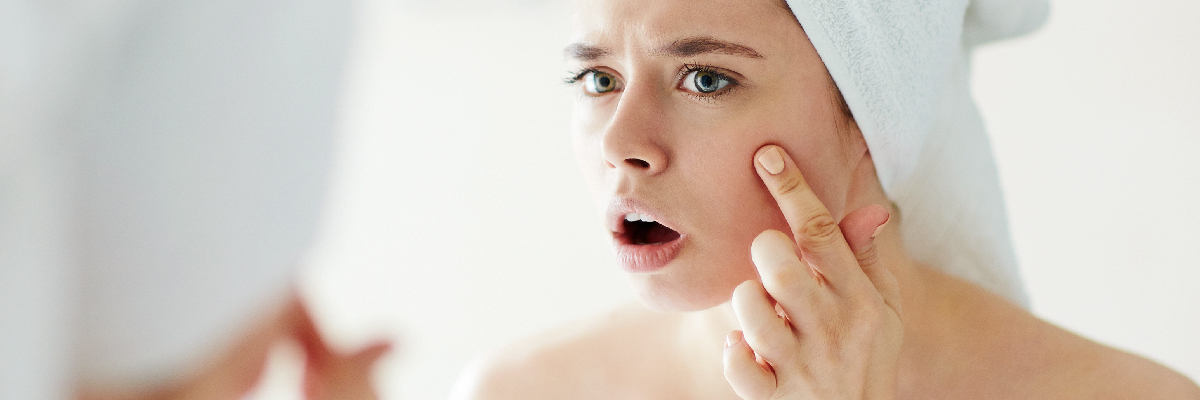
Article at a Glance
Acne is one of the most common skin complaints. People of all ages can get acne, but it is most common in teens and young adults. Approximately 80 percent of all people between the ages of 11 and 30 have at least occasional acne outbreaks.
Acne occurs when hair follicles become clogged. Hair follicles contain sebaceous glands that make sebum, an oil that protects the skin from bacterial infection and also reduces moisture loss, helping skin stay hydrated. This oil normally reaches the skin’s surface through the opening of the follicle called the pore. However, sometimes the oil, skin cells, and hair can produce a plug that blocks the pore. The trapped oil and cells allow bacteria to grow inside the follicle, which causes inflammation.
There are different kinds of acne depending on how the clogged pore responds. If a clogged pore closes up and bulges out from the skin, it is called a whitehead. A blackhead occurs when the clogged pore stays open and the sebum turns black when exposed to the air. Pimples are a small, red infection that occurs if the walls of the follicle break down and allow the bacteria to get under your skin. If the clogged follicle opens up deep in the skin, you can get a larger infection called a cyst.
The exact causes of acne are not fully understood, but doctors believe that development of acne is related to hormones and genetics. An increase in hormones called androgens causes the sebaceous glands to make more sebum, which can clog the pores and cause acne. Teens are more prone to acne because of the hormonal changes experienced during puberty. Pregnancy and starting or stopping birth control pills can also cause acne. Genetics also play a role in acne development. If your parents had acne, you are more likely to develop acne. Studies have shown that many school-age boys with acne have a family history of acne.
Certain drugs, including androgens and lithium, can also cause acne, as well as some greasy cosmetics. However, despite popular belief, eating greasy foods or chocolate does not. While stress doesn’t cause acne, it can make acne worse. Similarly, acne can be worsened by pressure on the skin from sports equipment or tight clothing, pollution, high humidity, picking at blemishes, working with greasy substances (like fast food), scrubbing the skin too hard, and hormonal changes before the female menstrual period.
You may find over-the-counter acne products helpful. There are several types and you might need to try more than one treatment to determine which works best for you. The most common over-the-counter acne products contain benzoyl peroxide, resorcinol, salicylic acid, or sulfur. You probably won’t see results immediately; it may take up to eight weeks before you notice any significant improvement. Be sure to follow the instructions carefully. Try any new treatment sparingly at first, to be sure you are not allergic to the product. Contact your pediatrician if you have any questions or to report any severe or long-lasting side effects.
Sitting out in the sun will not help clear up your acne. A suntan may temporarily make the acne less obvious, but it does not get rid of acne. Sun exposure also increases the risk of developing skin cancer and wrinkles.
Resist the urge to scrub hard or pick at your skin, as doing so will not make acne go away. Squeezing or “popping” pimples increases inflammation and can lead to permanent scarring.
If over-the-counter treatments do not seem to help, see your pediatrician. Your pediatrician can recommend additional over-the-counter products, prescribe stronger medicine or refer you to a dermatologist if needed. The best way to prevent scarring is by seeking treatment early.
For more information, see:
http://www.niams.nih.gov/Health_Info/Acne/default.asp
http://pediatrics.aappublications.org/content/131/Supplement_3/S163